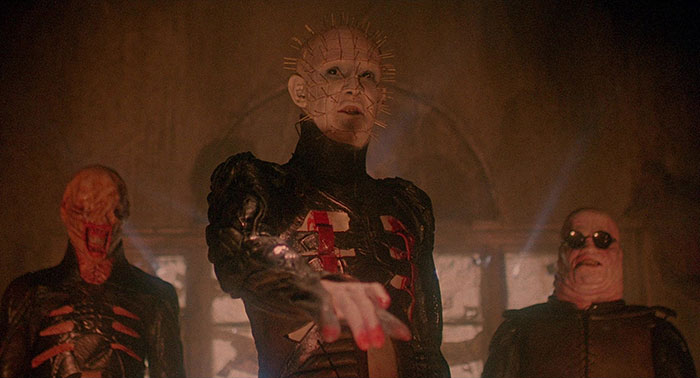
Clive Barker’s Hellraiser (a.k.a. Hellraiser) (1987)
**/**** Image A Sound B+ Extras A
starring Andrew Robinson, Clare Higgins, Sean Chapman, Ashley Laurence
written and directed by Clive Barker
Hellbound: Hellraiser II (1988)
***/**** Image A- Sound A Extras A
starring Clare Higgins, Ashley Laurence, Kenneth Cranham, Imogen Boorman
screenplay by Peter Atkins
directed by Tony Randel
Hellraiser III: Hell on Earth (1992)
*/**** Image B Sound B Extras B
starring Terry Farrell, Doug Bradley, Paula Marshall, Ashley Laurence
written by Peter Atkins
directed by Anthony Hickox
by Walter Chaw Pinhead (Doug Bradley) looks menacing, but he’s actually just a leather-daddy who seems reluctant, most of the time, to do what other people think is in his job description. There’s a scene at the end of the first Hellraiser, the only one written and directed by creator Clive Barker, where Pinhead and his good-time boys and girls (“Cenobites,” if you must, an appropriation of another term for “monk”) are about to tear heroic Kirsty (Ashley Laurence) apart when she asks for a chance to explain something. Pinhead patiently hears her out. In the sequel, as she’s running away, rather than hooking her in place with their literal hooks on chains, Pinhead and his Cenobites send the chain to block her way, instead. They’re terrible villains, Cenobites. They’re fun to look at–Hellraiser‘s creature design is, of course, legendary, with Pinhead occupying a privileged place on the Mt. Rushmore of horror bogeys–but more mildly-disapproving Greek Chorus than Iron Maiden. Reason in part, I think, for why they were disastrously made into stock slasher villains in the third film: part wise-cracking Freddy Krueger, part Jason Vorhees rampaging psychopaths. The failure of that metamorphosis and the ensuing wrestling with what role Cenobites should ultimately occupy comprise the minor ups and horrific downs of the seven films (and counting) to follow. Maybe it’s in the name. Maybe the idea never was for the Cenobites, these dour, British, monastic, S&M losers, to be avenging angels, but rather for them to be precisely what they are: these drippy scolds who appear at the exact moment you go searching for more outré porn on an unprotected browser. One of a couple of Pinhead’s catchphrases doubles as a carnival barker’s patter: “We have such sights to show you.” His buddies represent that banner of geeks and sideshow freaks. But they’re not going to force it on you. In the pantheon of bad guys, they’re maybe the only ones who not only need but would like your consent, if you don’t mind, please and thanks ever so.

